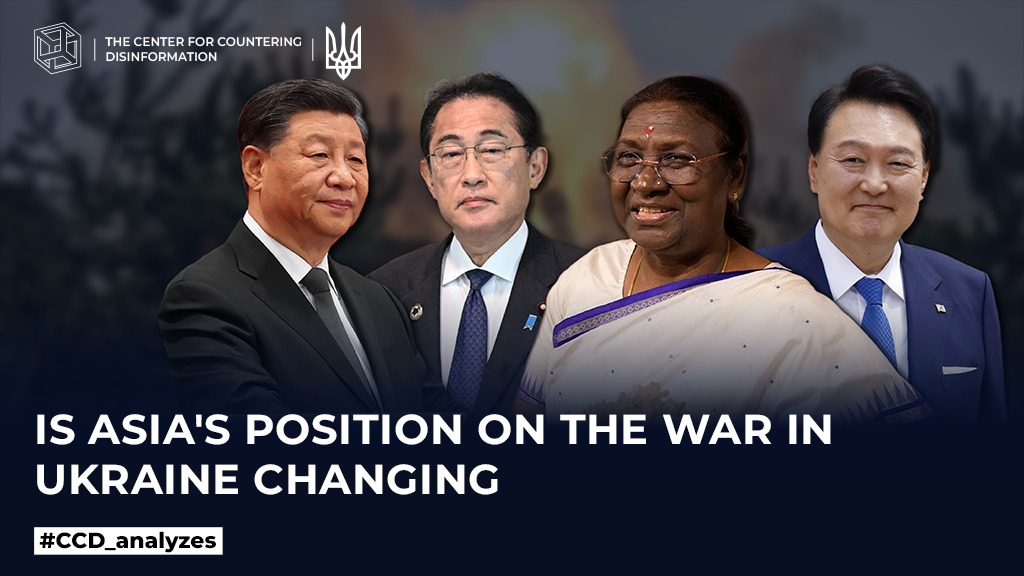After a year and a half since the beginning of russia’s full-scale invasion, the question of where the leaders of different countries stand on russia, Ukraine, and the war is becoming crucial. While the vast majority of Western countries have responded to the aggression with political, military, and financial support for Ukraine, the situation is not so simple in the Asian region, with the largest Asian countries still not having chosen sides
What is the region’s attitude to a full-scale war in Ukraine?
China is undoubtedly the largest player in Asia, and other major countries in the region (India, Japan, and South Korea) largely base their policies on Beijing’s position.
Asia’s view of the events in Ukraine is not unambiguous. China publicly takes a neutral position on the issue of russian aggression against Ukraine. At the same time, while claiming to comply with international law, Beijing helps russia circumvent sanctions, and Chinese companies massively export drones and military equipment to russia, which undoubtedly affects the course of hostilities in Ukraine.
India, as one of the largest regional players, also adheres to a kind of neutrality towards Ukraine and the so-called non-alignment policy. The Indian authorities abstained from voting on key UN General Assembly resolutions on Ukraine, such as the one condemning russian aggression and the Ukrainian peace formula.
Japan, South Korea, Singapore, and Taiwan have taken the war in Ukraine very seriously and are actively defending Ukrainian interests in Asia.
Why is this happening?
Although it is impossible to find a more diverse region on the world map, the historical mentality of most Asian countries is characterized by pragmatism and support for the stronger side in a conflict. Therefore, most countries in the Asian region follow the so-called “dragon strategy”, waiting until it is clear who is winning to take their side. It is not surprising that taking advantage of russia’s gap with European markets, China, together with India, began to buy russian energy resources at huge discounts (China and India account for about 80% of russian exports).
At the same time, China’s readiness to continue supporting moscow in its aggression against Ukraine directly depends on the results of weighing all the disadvantages and advantages of supporting russia.
On the one hand, China benefits from the war in Ukraine, as it weakens russia and makes the kremlin more and more dependent on Beijing. In its struggle with the United States for geopolitical primacy, Beijing uses russia as a situational political partner and a raw material base for its economy. Therefore, the collapse of russia would disrupt the stability in the region, which China is so eager to achieve. Regime change in russia is also not in China’s interests, as it is not clear whether the new government will want to continue the partnership on today’s favorable terms.
On the other hand, the proximity to moscow has worsened China’s relations with the EU, with which it has strong trade ties. Because of anti-russian sanctions, China had to change its logistics routes, and some Chinese companies were subject to Western restrictions because of their cooperation with russia. The kremlin’s termination of the grain deal was another factor of discontent due to the disruption of the logistics of Ukrainian grain supplies to China. The war has also exacerbated the situation around Taiwan and radically damaged relations with the United States. Therefore, further continuation of the war in Ukraine is less and less in Beijing’s interest, as evidenced by China’s unexpected involvement in international efforts to end it.
Although it is impossible to predict further actions, the blocking of the grain corridor, which affected China’s interests, and the prigozhin rebellion, which showed the putin regime’s inability to withstand such challenges, have already prompted Beijing to gradually reconsider its position on russia and the war in Ukraine. Of course, the Chinese “peace formula” unveiled at the Vilnius summit does not mention the withdrawal of russian troops, but it does call for an end to hostilities and negotiations and support for the key principle of Ukraine’s territorial integrity and sovereignty. Such “Chinese diplomacy” can hardly be interpreted as an intention to negotiate a just peace, but the desire to bring russia to the negotiating table is obvious. Moreover, this is not the first Chinese attempt to restore damaged ties with Europe. It was Chinese leader Xi Jinping who personally warned putin against using nuclear weapons in a war with Ukraine during his visit to moscow.
At the same time, India also claims to be a regional leader and has tense relations and territorial disputes with China, and wants to prevent the kremlin from becoming completely dependent on China and continue to be an economic partner. No wonder “neutral” India also joined the meeting on the peace formula in Saudi Arabia.
❗️The diplomatic efforts of Ukraine and the West to engage the Global South to end the war with russia are of particular importance, as such comprehensive work is beginning to bear fruit.










